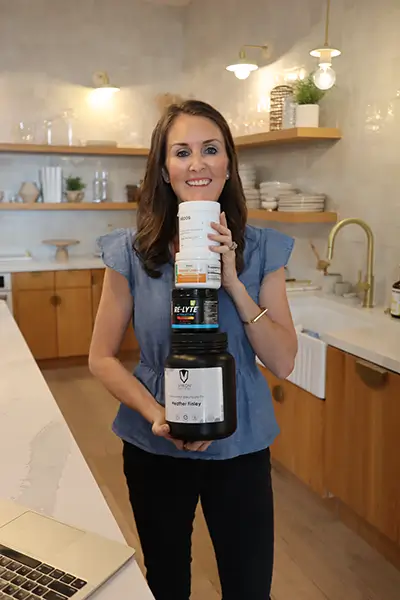So many women feel like they’re doing everything they are supposed to do and still feel exhausted, puffy, or stuck at the same weight for months. When your metabolism feels slow, no matter how clean you eat or how often you work out, it is frustrating.
What most women never learn is that minerals play a huge role in how their metabolism and energy functions day to day. When minerals are depleted, your body shifts into conservation mode, and everything from energy to digestion to weight loss becomes harder than it should be. This can be an incredibly frustrating cycle especially if you feel like you are doing all the “right things” but not getting results.
Why Your Metabolism Might Feel Stuck
A slow metabolism is rarely about age or willpower. Most women who feel stuck are actually dealing with signs of mineral depletion long before they hear the word imbalance. Fatigue, weight loss, resistance, constipation, mood swings, and feeling “off” even when your labs are normal are all clues that your cells do not have what they need to produce energy.
Many women are told their bloodwork looks fine and they just need to eat less, work out more, or accept that this is their new normal. When your body is depleted at a deeper level, restrictive plans not only fail but can make things worse.
Your metabolism slows further because your body is trying to protect you. Before you can burn fat efficiently, your body needs to feel safe and nourished.
How Minerals Actually Boost Your Metabolism
Minerals are involved in every step of energy production. They support thyroid hormone conversion, adrenal function, blood sugar balance, hydration, and digestion. When they are low, your metabolic rate naturally slows down so its hard to make progress.
Magnesium, Sodium, and Potassium Support Cellular Energy
This trio of minerals helps regulate hydration, nerve function, and ATP production. Low levels make you feel tired, bloated, constipated, and more prone to afternoon crashes. You may follow the perfect workout plan and still feel like nothing is changing because your cells simply do not have what they need to create energy.
Copper, Zinc, and Iron Support Hormone and Thyroid Function
These minerals help convert T4 to T3, manage insulin, prevent hair loss and keep metabolism stable. When they are off, metabolism drops, cravings spike, and the scale barely moves, even with a consistent routine. Your thyroid labs might be normal, but because of these mineral imbalances, your thyroid could be functioning suboptimally.
Why Supplements Alone Don’t Fix It
Minerals work in relationships with each other. If one is low, another often cannot function properly. This is why people can take magnesium and still be constipated or take a multivitamin and still feel exhausted. The issue is not more supplements. It is the right minerals in the right ratios for your body.
What Mineral Testing Shows About Your Metabolism
Traditional bloodwork often misses deeper mineral patterns. This is why someone can have “normal” labs yet feel far from normal. Mineral testing, like HTMA, looks at long-term mineral storage and how your body adapts under stress.
Patterns on an HTMA can reveal:
• low sodium that blocks energy production
• low magnesium that slows motility and increases stress on the gut
• potassium depletion that impacts thyroid function and blood sugar balance
• mineral ratios that make weight loss difficult even with a clean diet
For many women, seeing their mineral patterns is the first time their symptoms finally make sense. It explains why nothing else has worked and why their metabolism has felt resistant, no matter how hard they try.
How to Boost Your Metabolism with Mineral Support
When you begin rebuilding minerals, the shift does not happen overnight. Most women feel small changes first. More consistent energy. Fewer crashes. Better sleep. Less bloating by the end of the day. Over time, these changes compound, and metabolism becomes more responsive again.
A Few Simple Ways to Support Mineral Balance
Once your metabolism has the raw materials it needs, things start to shift. These are small, realistic changes that make a big difference over time.
- Adding potassium-rich foods like avocado, sweet potatoes, coconut water, or bananas to meals.
- Using high-quality sea salt to support sodium and hydration.
- Including mineral-rich foods such as yogurt, eggs, beans, and leafy greens. (download our free mineral guide here with tons of recipes and ideas!)
- Supporting digestion so minerals can actually be absorbed.
- Using targeted mineral support based on your patterns instead of guessing.
Even one or two of these habits can help your body feel more supported, and layering them in slowly is often what creates the biggest long-term change.
Slow, Steady Progress Creates Real Change
Metabolism is not supposed to change in one week. It changes when your cells finally have the raw materials to function. For many women, the three-month mark is when things begin to noticeably shift. They feel lighter, calmer, and more energized, and their body finally starts responding to their efforts again.
Your Metabolism Can Improve When You Give Your Body What It Needs
When your minerals are supported, everything else feels easier. Energy improves. Digestion becomes more regular. Mood steadies. Weight finally begins to move again. You do not need more willpower or more restriction. You need nourishment at the cellular level so your body can do what it is designed to do.
If you are tired of doing everything right and seeing nothing change, this is your sign to go deeper. Mineral patterns hold answers that your bloodwork cannot.You can take the next step with an HTMA test or comprehensive support and a personalized plan through the gutTogether® program.








